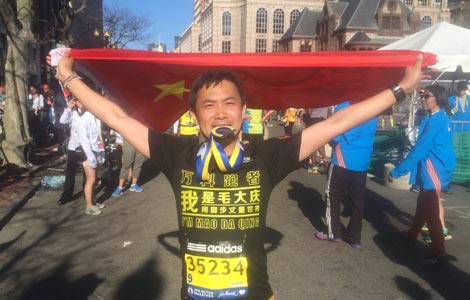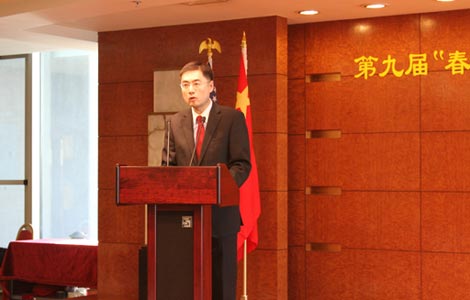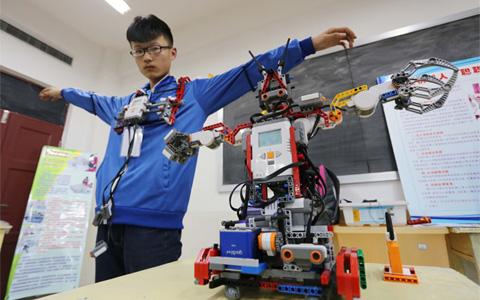Senior official accused of graft
Updated: 2014-04-24 06:59
By An Baijie and Zhang Yan (China Daily)
|
||||||||
Former deputy governor of Hubei removed from post in bribery case
A former senior official in Hubei province is being probed by the country's top procuratorate amid an enhanced crackdown on corruption.
The Supreme People's Procuratorate is investigating Guo Youming, former deputy governor of Hubei, on bribery charges, according to a statement released on the SPP's website on Wednesday.
Guo, 57, was removed from his post by the provincial people's congress in January after he was investigated in November by the Central Commission for Discipline Inspection of the Communist Party of China, the Party's top anti-graft agency.
Under current rules, senior officials accused of corruption are always initially investigated by the Central Commission for Discipline Inspection before they are transferred to judicial authorities.
On Tuesday, the commission announced the decision to expel Guo from the Party for "serious disciplinary violations", including abusing his power to seek benefits and receiving "a huge amount" of money or gifts for himself, his family members or other relatives.
The commission also accused Guo of "moral corruption", which can mean that an official has mistresses.
Guo, a native of Hubei, worked for the local water resources authorities for 18 years before he was nominated as deputy Party chief of Yichang in 2000. He worked in Yichang for 12 years before becoming deputy governor of the province.
Two of Guo's former colleagues in Yichang have also been investigated on corruption allegations. Zheng Xinghua, deputy mayor of Yichang, was investigated in January. Wang Hongqiang, deputy head of the city's people's congress, was investigated earlier this month.
A local anti-corruption official told the China Business News that Guo might have given special favors to Yichang Three Gorges Quantong Coated and Galvanized Plate Co, a private business that ran into financial difficulties and halted production in 2012 despite Guo's help.
The newspaper also accused Guo of accepting 150 million yuan ($24 million) from a real estate company in Yichang. Several property developers in the city were detained by the police before the investigation into Guo began.
A source from the local government told the 21st Century Business Herald that the probe is related to Guo's work with the water resources authorities. The Three Gorges Dam and the South-to-North Water Diversion project are all partly located in Hubei.
Prosecutors have expanded investigations into corruption in recent years. Last year, prosecuting departments investigated 37,551 cases of work-related crimes - 9.4 percent more than the previous year - involving 51,306 people, according to the SPP.
There has been a sharp increase in the number of high-level officials involved in such cases. Of those, eight officials at ministerial level and 253 above bureau-chief level were investigated for graft last year, an increase of 42 percent compared with 2012, according to the SPP.
The cases included Liu Tienan, former deputy director of the National Development and Reform Commission, and Wang Suyi, former head of the Inner Mongolia autonomous region's united front work department; as well as Li Daqiu, deputy head of the Guangxi Zhuang autonomous region's top political advisory organ.
National prosecutors have recovered 10.14 billion yuan in "dirty money" or property, and brought back 640 fugitives who escaped overseas to face corruption charges, according to the SPP.
"Corruption has its root in the abuse of power," Cao Jianming, prosecutor-general at the SPP, said last month. "The key is to perfect the supervision mechanism and prevent officials' abusing their powers for personal benefit."
Zhan Fuliang, director of the anti-corruption and bribery bureau under the SPP, said graft cases tend to be grouped, centralized and regional.
To intensify the crackdown on graft, national prosecutors will attach great importance to investigations of State monopoly industries, including the railway, electricity, petroleum and telecommunications sectors, where power is centralized and capital flow is intense, he said.
They will also intensify their supervision on construction, real estate development and land and resource management, as well as other key state investment areas including water conservation, environmental protection and the financial sector, he said.
The top prosecuting department will also release timely information about proceedings in major cases and important judicial interpretations on their official website, and through new media platforms such as micro blogs, to boost transparency, said Yan Li, a spokeswoman for the top prosecuting department.
Anti-graft authorities will also pay more attention to the promotion of officials and intensify supervision on the election of legislators and political advisers for governmental agencies at each level, Zhan said.
Contact the writers at anbaijie@chinadaily.com.cn and zhangyan1@chinadaily.com.cn

 First Tesla luxury sedans arrive in China
First Tesla luxury sedans arrive in China
 In this year's Boston Marathon, everyone's a winner
In this year's Boston Marathon, everyone's a winner
 Innovation competition kicks off in New York
Innovation competition kicks off in New York
 Automatic response
Automatic response
 Public figures give thoughts on World Book Day
Public figures give thoughts on World Book Day
 Dignitaries and royals raise ecological awareness
Dignitaries and royals raise ecological awareness
 Apple goes green to mark Earth Day
Apple goes green to mark Earth Day
 Beijing Auto Show – models backstage
Beijing Auto Show – models backstage
Most Viewed
Editor's Picks

|

|

|

|

|

|
Today's Top News
Slower growth poses challenges: AmCham
New investment rules open doors
Tesla luxury sedans arrive in China
Lenovo plans sales of 100m smartphones
Pact to reduce sea conflicts
In this year's Boston Marathon, everyone's a winner
Innovation competition opens in NY
Composer lauds classical music in era of pop songs
US Weekly

|

|







